 Petzlover
Petzlover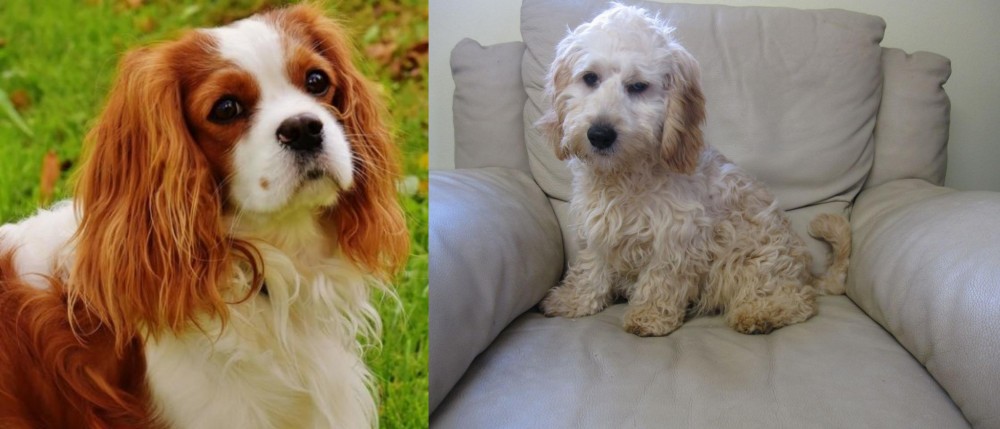 Cavalier King Charles Spaniel is originated from United Kingdom but Cockachon is originated from United States. Cavalier King Charles Spaniel may grow 6 cm / 2 inches shorter than Cockachon. Both Cavalier King Charles Spaniel and Cockachon are of same weight. Both Cavalier King Charles Spaniel and Cockachon has almost same life span. Both Cavalier King Charles Spaniel and Cockachon has same litter size. Cavalier King Charles Spaniel requires Moderate Maintenance. But Cockachon requires Low Maintenance
Cavalier King Charles Spaniel is originated from United Kingdom but Cockachon is originated from United States. Cavalier King Charles Spaniel may grow 6 cm / 2 inches shorter than Cockachon. Both Cavalier King Charles Spaniel and Cockachon are of same weight. Both Cavalier King Charles Spaniel and Cockachon has almost same life span. Both Cavalier King Charles Spaniel and Cockachon has same litter size. Cavalier King Charles Spaniel requires Moderate Maintenance. But Cockachon requires Low Maintenance
 The origin of the Cavalier King Charles Spaniel goes back many centuries. It was in 1928 that this spaniel breed was separated from the smaller King Charles and these were particularly popular with royalty in England.
The origin of the Cavalier King Charles Spaniel goes back many centuries. It was in 1928 that this spaniel breed was separated from the smaller King Charles and these were particularly popular with royalty in England.
In fact, Mary, Queen of Scots had one of these spaniels who accompanied her to her beheading. It was her grandsons who gave their name to the breed, and King Charles II, who reigned from 1660 to 1685 kept these dogs. After Charles II's death, the dog’s popularity waned somewhat. The dog was later bred with pugs giving them the familiar features they have today, such as the domed head and the shorter nose.
Interest in the breed revived, and a breed -club was established, drawing up a breed standard. Finally, in 1945, the Cavalier King Charles Spaniel was recognized as a separate breed.
 The Cockachon is not a pure bred dog but rather a cross between the Cocker Spaniel and the Bichon Frise. Very little if anything is known about who initially developed the Cockachon. It is known that the International Designer Canine Association (IDCA)registered and recognized the hybrid in 2009.
The Cockachon is not a pure bred dog but rather a cross between the Cocker Spaniel and the Bichon Frise. Very little if anything is known about who initially developed the Cockachon. It is known that the International Designer Canine Association (IDCA)registered and recognized the hybrid in 2009.
It is obviously a relatively new cross breed. The hybrid is also recognized by the American Canine Hybrid Club (ACHC), International Designer Canine Registry (IDCR) and the Designer Dog Kennel Club (DDKC).
 The Cavalier King Charles Spaniel is a small to medium sized dog wih its height being 31 – 33cm and its weight being 5 – 8 or 9 kg. He is known for his long, silky coat which is fairly straight and feathery.
The Cavalier King Charles Spaniel is a small to medium sized dog wih its height being 31 – 33cm and its weight being 5 – 8 or 9 kg. He is known for his long, silky coat which is fairly straight and feathery.
He has floppy ears, and with this Spaniel breed the tail is generally left long and feathery. The coat comes in many different colors so you will find the popular rich red shade with white, he can be black and tan or even tri-color.
The Cavalier King Charles Spaniel is affectionate, playful and eager to please. He makes an excellent pet for children as well and gets on well with other pets in the home too.
They adapt quickly to different environments and will be happy in the city or in the country, so long as his owner is with him and meters out lots of love and attention. He is intelligent and responds well to training and socialization, turning him from a playful puppy into a relaxed, obedient adult dog.
The Cavalier loves to be active but he also loves to be quietly lying next to his owner. It is also why these dogs make such splendid companions for the elderly as well as being a good choice for therapy dogs.
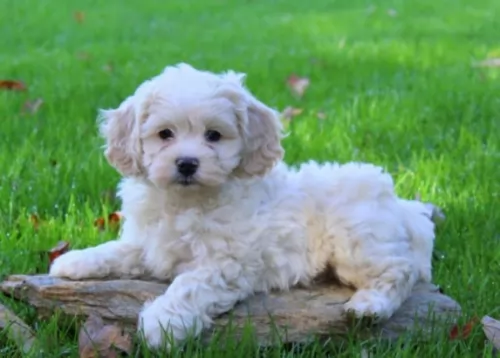 The Cockachon is a cute, little dog very popular in current times. He is small, compact, dark eyes, a round head and black nose. He has a baby face and fluffy hair. It has a furry tail and a blunt muzzle.
The Cockachon is a cute, little dog very popular in current times. He is small, compact, dark eyes, a round head and black nose. He has a baby face and fluffy hair. It has a furry tail and a blunt muzzle.
The Cockachon is a mix between the American Cocker Spaniel and the Bichon Frise. In order to get a better idea of what the hybrid can look like just look at the individual parents. The American Cocker Spaniel is a small dog with a short muzzle and domed head. It is in the Sporting Group, but it is the smallest member of the group. He has a compact, sturdy body and though domed his head is refined.
The Cocker’s stance includes a sloping topline, muscular hindquarters and strong shorter legs adds up to a balanced canine. The coat can be in a wide variety of colors including liver, golden, black, and red. Also, it could be liver and tan, black and tan, roan or tricolors. So, while the Bichon Frise is always white the Cockachon can be any of these colors including white. The types of coats that the Cocker Spaniel and the Bichon Frise have are very different as well.
The Bichon Frise is also a small dog, actually smaller than the American Cocker. The Cockachon usually ends up being about the size of the Bichon at 5-10 kg in weight and 23-30 cm in height. The skull of the Bichon Frise is round rather than domed and the muzzle is also rounded. The tail is long and curly while the Cocker would usually have a cropped tail. The nose and eyes of the Bichon Frise are black and its hair is dense and curly. Unlike the Cocker Spaniel it barely sheds.
Many Cockachon have floppy ears, curly coats and come in any variety of colors though many, many are white.
 The Cavlier King Charles Spaniel is an affectionate, playful and eager-to-please dog breed that is good with children and other dogs. They will be happy to join you in any games you have in mind but will easily lie quietly beside you for companionship too.
The Cavlier King Charles Spaniel is an affectionate, playful and eager-to-please dog breed that is good with children and other dogs. They will be happy to join you in any games you have in mind but will easily lie quietly beside you for companionship too.
This spaniel breed is exceptionally intelligent and can be easily trained and socialized, making them even better behaved dogs.
For their gentle, sweet nature, it is no wonder that they make such excellent therapy dogs for children and adults, and he is willing to be a wonderful friend to you too.
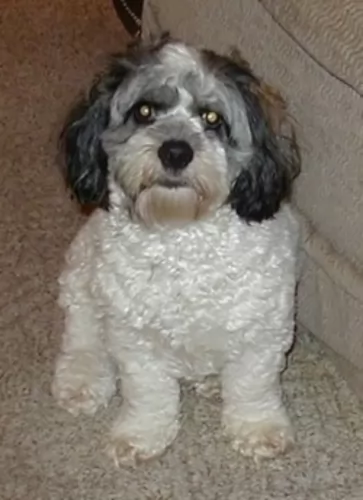 People created the Cockachon to get a small, lap or carry dog that had certain characteristics. These characteristics included a very social, loving dog. He is active and friendly, sweet and gentle. He is loyal, and loves being loved. He is great with other dogs and you can trust him with your children. He is a little independent but very loyal.
People created the Cockachon to get a small, lap or carry dog that had certain characteristics. These characteristics included a very social, loving dog. He is active and friendly, sweet and gentle. He is loyal, and loves being loved. He is great with other dogs and you can trust him with your children. He is a little independent but very loyal.
Like many little dogs he can have serious separation anxiety. Crate training is recommended so that he has a place to feel safe when you are not with him.
 Cavaliers are generally fairly healthy dogs but they are prone to mitral valve disease which can lead to heart failure. The heart as 4 chambers and each chamber has a one-way valve to keep blood from flowing backward. One of these is the mitral valve and it can leak over time resulting in a heart murmur. Dogs as young as 4 years of age can develop a murmur from a leaking mitral valve.
Cavaliers are generally fairly healthy dogs but they are prone to mitral valve disease which can lead to heart failure. The heart as 4 chambers and each chamber has a one-way valve to keep blood from flowing backward. One of these is the mitral valve and it can leak over time resulting in a heart murmur. Dogs as young as 4 years of age can develop a murmur from a leaking mitral valve.
Congestive heart failure develops, your dog has a chronic cough and lacks stamina. A veterinary cardiologist may need to be called in to recommend some kind of medical intervention. The vet will evaluate your pet's condition and lifestyle before making a recommendation.
Other health problems which the Cavalier might have to contend with will be luxating patella as well as eye issues.
This condition affects toy breeds, occuring when the kneecaps slip out of place. It can be severe enough to cause lameness in the dogs leg, but fortunately it can be managed with an anti-inflammatory or even surgery.
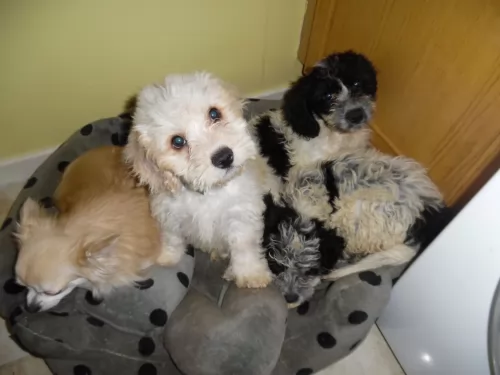 Hybrid dogs seldom have a lot of inherited diseases as they seem to jump a generation but if they do, it can be either a combination of both breeds issues or issues from just one of the breeds in the cross. For the Cockachon these issues include:
Hybrid dogs seldom have a lot of inherited diseases as they seem to jump a generation but if they do, it can be either a combination of both breeds issues or issues from just one of the breeds in the cross. For the Cockachon these issues include:
This loose kneecap issue is common to many small dogs and can cause lameness if not addressed.
Eyelid problems such as the ones that might bother a Cockachon can be found in many small dogs. These include Entropion and Ectropion.
 The Cavalier Spaniel’s long silky coat will require brushing at least twice a week to remove loose hairs and to keep it healthy and shiny. This is one spaniel however, that won’t require trimming. However, because he loves to be playing outdoors, some owners do trim the dog’s feathers around the legs and paws.
The Cavalier Spaniel’s long silky coat will require brushing at least twice a week to remove loose hairs and to keep it healthy and shiny. This is one spaniel however, that won’t require trimming. However, because he loves to be playing outdoors, some owners do trim the dog’s feathers around the legs and paws.
As a dog with floppy ears, it will become essential to check his ears for wax build-up and moisture within the ears combined with dirt. This can lead to ear infections. Also the silky ears can be prone to matting. You can wash them gently with dog shampoo.
Smaller dogs like the Cavalier Spaniel are more likely to develop dental problems because of the structure of their skulls and jaws which are more compressed. Brush your dogs teeth 2 or 3 times a week with special canine tooth-paste and toothbrush.
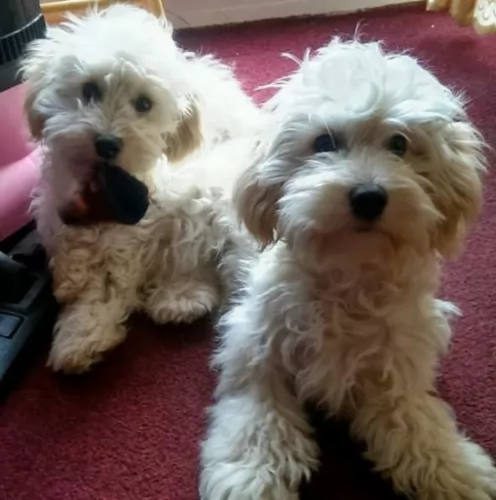 Don’t overfeed a Cockachon. Give him ¾ -1.5 cups of dry food of high quality in two meals per day.
Don’t overfeed a Cockachon. Give him ¾ -1.5 cups of dry food of high quality in two meals per day.
In addition to the issues listed above, the Cockachon is also prone to heart disease and cardiac issues.
The Cockachon has a lot of energy for its size. Make sure it gets plenty of exercise. If walks are the exercise of your choice make sure you walk him for 30 minutes a day. He loves to play, and a back yard would be nice. These little guys do well in obedience but are usually to small for agility.